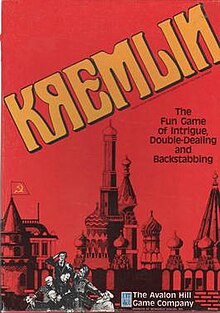Gameplay
Each player controls a number of politician cards depicting caricatures of Soviet politicians. These are arranged in a pyramid on the game board, representing a hierarchy of power. Players promote, demote and exile these politicians in order to maneuver their own politicians to the top of the pyramid. Each turn, the Party Chief "waves" from the rostrum during a military parade in Red Square. If a player's politician waves during three non-consecutive years, that player wins. Additionally, politicians age and each year there is a chance they will die. If no player is able to wave three times, the player with the highest ranking politician at the end of the health phase of the 11th turn wins the game.
Reception
In the October 1988 edition of Games International (Issue 1), Brian Walker reviewed the Avalon Hill version as the magazine's "Game of the Month." Walker thought the production values of the components were "quite superb", and admired the game rules. He concluded by giving the game a perfect rating of 5 out of 5, saying, "It is difficult to determine the skill/luck ratio in this strange game, but who cares? The important thing is that it is such fun to play." [1]
In the December 1993 edition of Dragon (Issue 200), Allen Varney reviewed Avalon Hill's 1988 edition and the 1989 expansion set favorably, saying, "Makes for backbiting, double-crossing fun, and Avalon Hill’s advanced rules work well." [2]
Kremlin was chosen for inclusion in the 2007 book Hobby Games: The 100 Best . Lester Smith commented, "Kremlin invites us to look back on the Soviet era and put it in perspective through laughter. The humor in Kremlin is gallows humor, of course, as anyone who lived through the 1980s would attest. But the satire isn't constrained by its ties to the past, or to one political superpower; with the minimum of imagination, Kremlin can easily be seen as a pointed jab at any corrupt and treacherous bureaucracy populated by ambitious old men." [3]
This page is based on this
Wikipedia article Text is available under the
CC BY-SA 4.0 license; additional terms may apply.
Images, videos and audio are available under their respective licenses.

